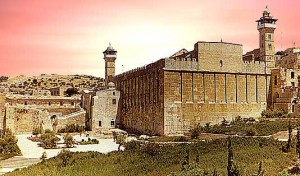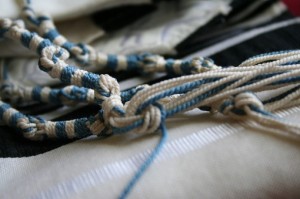[PCJE Dvar Torah] The Challenge of Conviction by Stu Jacobs
Posted on May 30, 2013 by Stu Jacobs
Tags: bible commentaries, bravery / courage, Calev / Caleb, continuity, destiny, dvar Torah, grammar, Hebron, meaning, Pardes Center for Jewish Educators (PCJE), Parsha / Parasha, Parshat Shlach, PCJE Dvar Torah, the future, the twelve spies, tzitzit
All the way back in December,
I shared some insights on Parshat Vayigash, a
parsha I mentioned as near and dear to my heart, as it is my
bar mitzvah parsha. This week’s
parsha,
Parshat Sh’lach, is also very dear to me, as it is the
parsha of our daughter, Elinoa’s, birth. I’d like to share a variation on an insight I gave in honor of her 1
st birthday, as we now celebrate her 3
rd birthday this week…
Parshat Sh’lach is a parsha rich in material for a dvar Torah—it contains two of the most well-known sections in all of Sefer Bemidbar: the narrative account of the מרגלים, and the details surrounding the mitzvah of ציצית. I’d like to focus our attention on one seemingly small detail in the narration of the story of the twelve scouts and then see if we can apply the concept of tzitzit to that insight.

Close to the outset of the description of the scout’s journey into and through the land of Canaan (Bemidbar/Numbers, Chapter 13, Verse 22), the Torah relates:
כב וַיַּעֲלוּ בַנֶּגֶב, וַיָּבֹא עַד-חֶבְרוֹן, וְשָׁם אֲחִימַן שֵׁשַׁי וְתַלְמַי, יְלִידֵי הָעֲנָק; וְחֶבְרוֹן, שֶׁבַע שָׁנִים נִבְנְתָה, לִפְנֵי, צֹעַן מִצְרָיִם.
They went up to the Negev. He came to Hevron…
With their attuned sixth sense for grammatical nuance and inconsistency, many of the Biblical commentators are confounded: Why does the text describes the group of twelve scouts traveling together (in the 3rd person plural) to scout out the land, only to immediately switch to describing the travels of one individual, unnamed person (switching to the 3rd person singular)? This grammatical inconsistency is further highlighted by the fact that every other verb used to describe the journeying of the scouts in this section of narrative is also in the plural form.
While a number of answers to this question are put forth to explain such a glaring inconsistency, I will focus on the most frequent answer given by the Medieval commentators to account for the use of the singular, ויבא, amidst a narrative otherwise completely told in the plural. The singular, ויבא, refers to just one of the scouts, Calev, who decided to visit Hevron as a personal detour. He, and he alone, made this detour, and did so for a particular reason—he wanted to pray at the gravesite of the avot and imahot (fore-fathers/mothers), called Ma’arat Ha’Mahpelah, located in Hevron. [The reason Calev is singled out by the commentators to be the one individual who makes this particular detour is that, later in the Biblical canon, Calev is identified as the leader who secures Hevron as part of his tribe’s inheritance in the Land.]
I find it fascinating to imagine a motley crew of 12 tribal leaders, embarking on this daunting and high-risk scout mission to a land they desperately hope will be the land they can settle in after generations of servitude. And then, seemingly out of nowhere, a single individual among them, Calev, speaks up and says, “Hey, guys, I just have to make a quick detour to Hevron—I’ll meet back up with you in Eshkol.” How could they have possibly let him break from the group? Wasn’t the mission dangerous enough, without one of the team members going off on his own? Didn’t they have specific instructions to follow? Didn’t he know this wasn’t a sightseeing tour of the Land?

Yet Calev, who we later know will be one of two strong-willed, courageous, and faithful leaders to hold fast to the idea that the Israelites can indeed conquer the Land, is adamant that he must make a stop in Hevron as part of his journey. How can he step foot in the land of his ancestors and not pay homage to them? How can he be on such an important mission and not visit the resting places of the pioneering mothers and fathers of his people, potentially to pray for his well-being and the ultimate success of the nation? Calev had many good reasons, and I’m sure plenty of peer pressure, not to make this detour at this particular moment. Yet, he stuck to his convictions and intuitions, and was ultimately rewarded by inheriting, along with his tribe, that special parcel of Eretz Yisrael in the future. Who knows, maybe it was precisely this detour to Hevron that gave Calev the courage and conviction to stand up and passionately plea for the Israelites to continue their march out of slavery towards their ultimate destiny.
We at Pardes, much like Calev, had many good reasons, whether social, financial, or familial pressures, not to take this year(s) to pick up and leave our places of residence in order to devote ourselves to the study of Torah. Yet, we each decided that a face-to-face encounter with the texts of our heritage was too important and too essential not to make this detour. Our challenge now, though, is to ensure that this in fact wasn’t a detour in our lives, but, rather, was an experience that will continue to guide and inform our actions well into the future.

For guidance on how to meet that challenge, we need to look towards the end of Parshat Sh’lach, where we find the description of the mitzvah of tzizit and see if we can take the message of the tzitzit to heart. As is stated in the verses describing the mitzvah of tzitzit, these special fringes inserted onto four-cornered garments act as a constant reminder of what we are called to do in this world. We need those constant reminders, otherwise it is very easy to lose focus, to become distracted and overwhelmed by all of those social, financial, or psychological pressures.
It is therefore our challenge, as we start to look back on this special and sacred time of learning at Pardes, to find ways to remind ourselves, over and over again, what we learned and experienced here. Maybe that means making a special effort to consistently keep in touch with the special people with whom you established connections this year. Maybe that means finding a weekly Torah class back home that will enable you to continue incorporating Torah learning into your life. Maybe that means booking your next trip back to Israel right now, to ensure that you continue to build a relationship with the land and its people. Maybe that means taking the teaching or text that most resonated with you during your time at Pardes and placing it in your wallet, or on your desktop, or in your email signature.
Only in this way can we be like Calev, who not only had the courage to follow his convictions, but who made sure his convictions remained with him, and continued to strengthen him, well into the future.